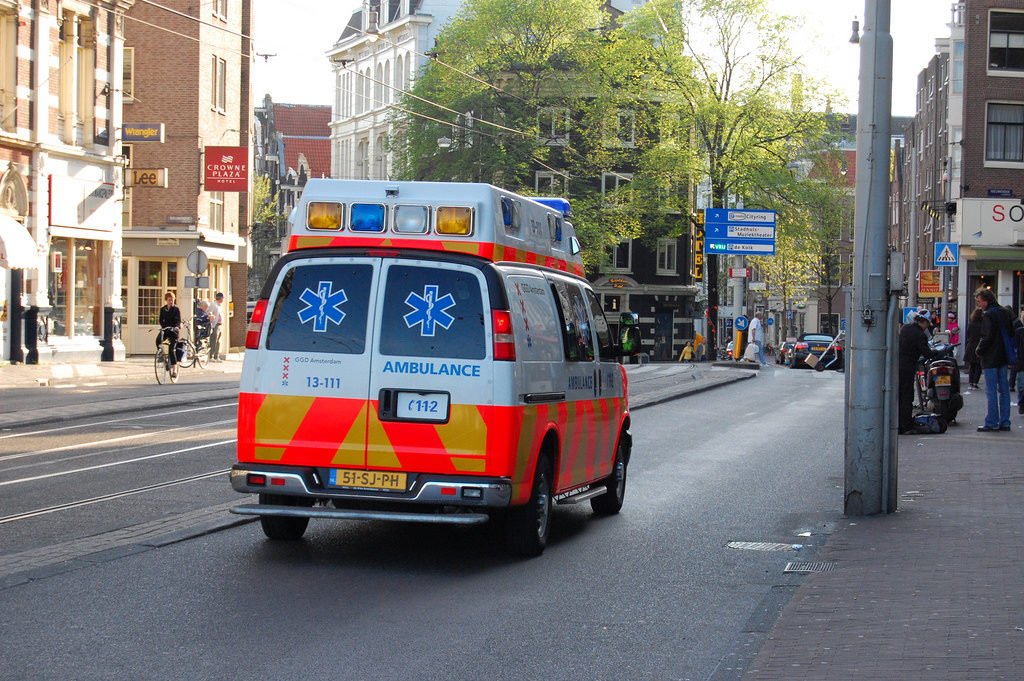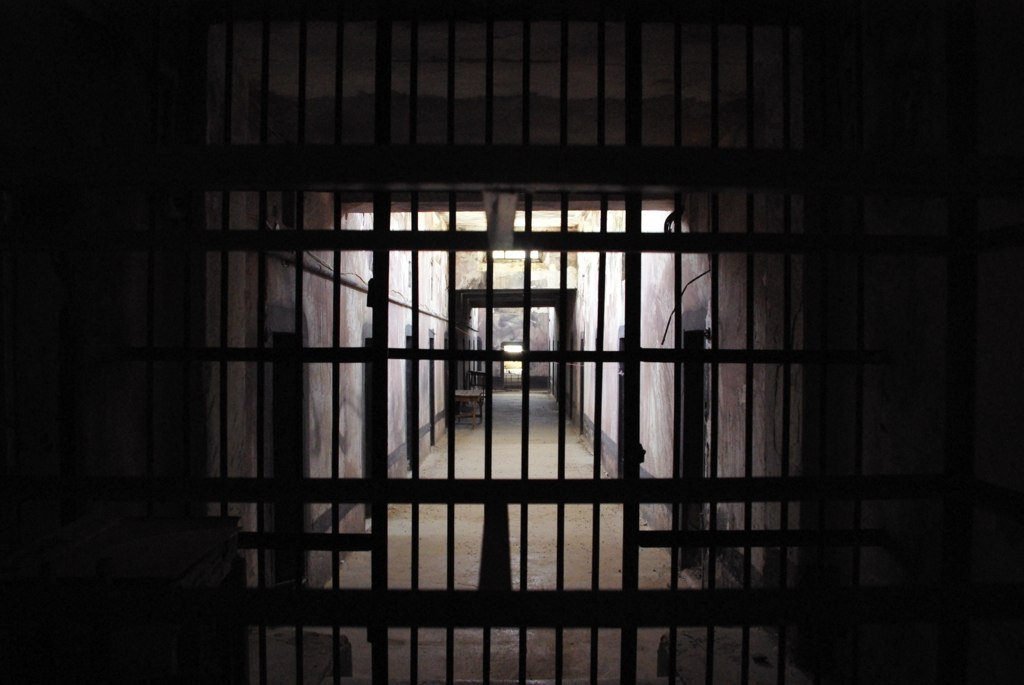***Heather Bartlett is the 1st place winner of Streetlight’s 2018 Essay/Memoir Contest***
“Working for 24 hours straight is all about your perspective,” he says. “Your body can handle it. Human beings adapt. Think about it. How many times have you stayed up all night studying? Or partying?”
“Sure,” I say, “but this is different.” It’s so hard. Physically. Without sleep I have to interact with so many people, make decisions and make sense. Both a patient and my partner are depending on me when I’m definitely not my best. I’m only partially sure it can be done.
“No—you studied because you had to, you partied because it was fun. See? Your head makes your decisions. And the difference. Our bodies are capable of incredible things.” The nurse’s eyes sparkle as he talks. I hope he is right.

Diti Penguin (flickr.com). CC license.
I’m sitting across from Jim, a critical care nurse, in the back of an ambulance on my first 24-hour shift. My partner Alvarez drives up front. We’re giving Jim a ride back to station after the three of us shared a call—a fragile hemophiliac fallen down a flight of stairs. Blood everywhere.
I think Nurse Jim must like me because he’s full of advice.
“If you wait until the right time to have kids, you’ll never have them,” he says. “It’s never the right time.”
I wonder if he gives the same advice to the male EMTs. But honestly, I’m more worried about enduring my shift than procreating at the moment. It’s 3pm; the way the sun is slanting across the freeway would normally indicate the near end of my day. But if I do the math, I still have 16 hours left.
***
For many EMTs, kicking ass on 24-hour shifts is a rite of passage. Crews work themselves into the ground, seemingly intent on beating their coworkers to exhaustion. We glorify our workaholics and give them bragging rights. New to the field, I so admire the crews clocking 80 hours a week with a smile. Ambulance companies have a fortune to make off selling their military-grade romanticism to industrious first responders.
My boyfriend has been harping lately, “You work ALL the time.” Psh! I tell him. 56 hours a week? It’s not enough. Not compared! I’m 25 years old. This is when we’re supposed to work, to save! To build something…
Except I’m not sure what I’m building yet, besides field experience and unfortunate real resentment for everyone outside this world. Outsiders seem soft, boyfriend included. I have clearly drunk the Kool-Aid that EMS has on offer.
It doesn’t help that my boyfriend’s unemployed. Or that we’re living with my mother. Or that lately, when I am home from work, I am either stuffing carbs into my face or sleeping.
“Whoa,” he says, watching me, as we sit with my mom around the dinner table. I am hunched over my spaghetti, shoveling food in my mouth. “Whoa…” he says again. Perpetually scrawny, I’ve never eaten like this in my life, but suddenly it’s as if I can’t inhale calories fast enough. All day long I’m lifting, straining, sweating, jumping, trying to keep up. Food is fuel.
“Delicious!” I tell my mom as I wipe my mouth. I haven’t contributed to the conversation at all but I’m already thinking about a shower and bed and how many hours of sleep I can get before my next shift.
This lifestyle isn’t for the weak of heart. It’s brutal, and the pay is shit too. $15 an hour, no lunch break, no overtime, no sick days, holidays or vacation.
Only the passionate and the desperate stay.
***
I’m here because on the worst night of my life a police officer grasped me by both shoulders. Blind with shock, I still remember every word he said. A demanding memory, I can’t help but keep returning, like a cut in the mouth I test with my tongue again and again.
I learned the intimate moments after trauma hold enormous potential. Healing or harm. I want to be the person that says the right thing.
We all know we’re expendable. It’s a job, not a career. A young person’s race. To what? Priority shifts, a better company, higher pay, street cred, titles, pensions, respect. If you fight your way up, you just might earn a comfortable wage. Climb the ladder.
Then something as minor as a broken finger means you’re off the rig, unable to work. No work means no income, or maybe worse: reassigned to dispatch. It’s a windowless, pitch-dark control room full of human drones on 12-hour shifts. Dispatchers perch before banks of computers and boxes of pastries, a live GPS map projected large against the wall. Their voices croak, cranky and uninviting across our radio. Their realm appears to be a special kind of administrative hell.
And at the end, you have two options: age out or wear out. Trash your back, fear your psyche, or turn 50. Why would anybody choose this life?
Thus the go-to conversation topic for new partners. “What got you into EMS?” An excellent introduction actually, much more telling than where someone’s from. What fuels your fire? What’s got you riding along on this madhouse?
***
I pick up a shift with a new partner, an EMT named Romero. He seems friendly enough. Short but muscular, he’s in his mid-forties, and notably missing a few front teeth.
“So, how’d you end up in EMS?” I ask. We set off from station, Romero driving. I hold our bulky metal clipboard in my lap.
“There was an accident,” he says. “Someone died.” As if that explains it.
Romero hesitates, his hands on the steering wheel and eyes on the road. Finally he finishes the thought. “It was my fault.”
I have exactly no idea what to say so I look at him with what I hope are kind eyes. I expect him to leave the story at that, but he continues.
“See I was driving to work one morning, I was late and rushing. Got into an accident. Bad. Lost my teeth and broke an arm, both legs. Was in the hospital for 6 months. But the other driver died.” He pauses. “My license had expired 3 days prior, I just hadn’t had a second to renew it. I swear, I was working all the time. So, driving without a license—it went from accident to vehicular manslaughter.” Romero speaks quickly. It sounds like a story he’s repeated often.
“Case went to trial, I went to jail. I can’t forget the family’s testimony. They wouldn’t look at me. I tried to tell them I’m sorry. I wake up every day with his death on my shoulders, that’s the truth.” He stops and looks to me and my heart is pounding because holy crap I can’t even imagine what he’s been through.
“I was given 7 years but got out in 3 months because of overcrowding.”
Romero seems open to talking about his tragedy, so I respond. “Dang, that was lucky,” I say. 7 years to 3 months.

“Yea, but when you go in, you don’t know you’re gonna get out early. You go in ready to do all that time in your mind. It fucks you up.” I realize I’m incredibly naïve and have no helpful insight to offer. I stay quiet.
“So anyway, when I got out, I had community service. I volunteered in a community hospital, it was great. When I was done I got a job with the medical examiner—body retrieval. That was nuts. Now I’m here,” he smiles.
“What about you?” he asks me. I hesitate and actually consider telling him the truth. He told me his, after all. Aren’t I impressed with the way he owns his shame?
But no—even against the vulnerabilities of a man condemned for taking a life. My reasons are still too dark, too close to everything that I am. I cannot blithely share with a near stranger. I cannot talk to him about rape.
“I took an epidemiology course in college and realized I loved medicine but didn’t want to go to med school or work in any kind of stuffy building. EMS seemed like an adventure,” I ramble. My go-to answer. Partially true. For Romero, it will have to be enough.
***
Our shift is chugging along unremarkably when dispatch sends us a hospital transfer call. We get these calls frequently—to transport non-ambulatory and medically fragile patients from one facility to another, to and from dialysis appointments, or after a hospital discharge, to get them home. Inter-facility transfers are a bulk of the work we do, but I still smile when people exclaim “you save lives!”
I hesitate to explain that the reality is much more complicated and much less heroic than simple life and death.
It’s a patient we know well, the type colloquially referred to as a “frequent flier”. Our crews interact with her so often that Alvarez has her patient information and medical history memorized. On the way to the hospital he prepares me for our call.
“Ok, so our patient lives in the Iron Triangle, you know what that is?” I don’t, so he tells me.
“It’s really dangerous, gangs, the cops are targeted. Sometimes we get flack because our uniforms look similar,” he says. I look down to my navy-blue shirt and pants. The badge on my chest.
“There’s actually a law on the books that cops can’t go out in single pairs. They always go out in teams—two cop cars, four cops. Otherwise they get murdered.” I’m not sure how literally to take Alvarez. I know he exaggerates.
“Listen, just follow your instincts,” he says. “If something doesn’t feel right, get your ass back to the rig. Pay attention to your surroundings at all times.” Ok, I tell him, I will.
We pick up our patient at the hospital and start to her home. I drive, following the GPS until we reach a crummy part of Richmond. Sure enough, it’s surrounded by a tall wire fence. The Iron Triangle.
But once inside, it’s just pastel houses, a few trees. If not for all the hype, the chain link fence that said “other”, I would think it a pretty nice place to live. It’s quiet here. Alvarez and I maneuver the patient into her house, lift her back into her bed. Say our pleasantries. Walk the empty gurney to the back of the ambulance.
As I clean the gurney I admit, “I don’t get what the big deal is.” Last year I lived on Geary and Taylor in San Francisco, the edge of the Tenderloin. I walked my dog there at night. To my mind, “bad area” means rampant homelessness, drug use, ominous characters. The streets here are bare.
“Last week I was here,” and Alvarez points to a house across the street. “A girl walked up to that house and rang the bell. Another girl answered, and she grabbed her by the hair and dragged her into the street!” I’m not sure what to make of that. Sounds gnarly, I admit, but I don’t get what it means.
“It’s gangs,” Alvarez says. “That’s why it’s so quiet. It’s not safe to walk around here.” And perfect timing; as he says that Bingk! there’s a loud new noise above us I’ve never heard before.
Bingk! it goes again. I stand near the gurney, so confused, tilting my head slightly, scanning, listening.
Bingk! Bingk! Bingk! “They’re shooting!” Alvarez screams and he dives for the inside of the rig. “Get in here, Bartlett! They’re taking out our lights!!” In awe, I look and sure enough, two of our red emergency lights are shattered by jagged bullet holes.
What. The. Fuck. I think. No, really. Here we are, to help! A community member! I couldn’t be more indignant. It occurs to me that if a bullet ricochets and hits the dumbass shooter in the leg, he’s going to ask me to come help him. And I would. Because we’re here to freaking help people. I am overwhelmed by disbelief. And fury.
“Are you kidding me?!” I scream. To no one in particular. To the vague area from which the bullets came. I feel like I know the shooters aren’t really trying to hit us. Like I know they’re just playing some sick game. I cannot know that actually.
“What the hell! Is this a joke?!” I yell again, my arms in the air, so angry, so navy blue, so intensely righteous. The bullets altogether stop. I stand, panting, facing the empty block.
“Oh, my GOD.” Alvarez appears, grabs my arm roughly and shoves me towards my seat on the rig. “You’re insane,” he says. I think we’re both shaking.
We have been trained: these aren’t your emergencies. As in, the disasters we respond to aren’t about you, so you’d better keep your shit together. I can’t believe I lost my logic. As I cool down, I know I’ve failed.
“Bartlett, you’re nuts,” Alvarez says again as he starts the engine of our poor, battered ambulance. And to himself, “This small crazy chick trying to take on the world.” He puts the rig into drive. “You’re scrappy.”
Later he will spread the nickname around station and I will grimace when the guys call after me: “Scrappy!” like a dog.
***
Made it to 5:30 am on this maiden 24-hour shift. Just one last hour and a half to go. 7am to 7am. Then I’m free and can drive 45 minutes home, shower and collapse in my white cloud bed. Truly, shower and sleep never sounded so good. Alvarez and I drive through San Mateo in the pre-morning light, heading in the direction of station.

“Let’s go get donuts,” he says.
This is the perfect time, when the other nocturnals are preparing. We meet them in their shop and they smile and wink, handing over the still hot rings of dough.
It’s why cops are associated with donuts. These shops are our places, a good spot to write case reports under fluorescent lights at some god awful hour. Surrounded by baked goods and other souls. One of the few places that stays normal in the night.
I break off the edge of an old-fashioned donut and put it to my lips. My ankles ache in my boots, my lower back screams. Only one more hour. The glaze dissolves upon my tongue like snow.

Share this post with your friends.

